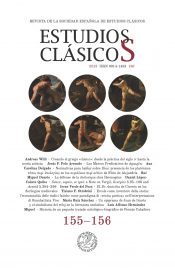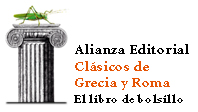Senex, segnis, se igni: a Note on Vergil, Georgics 3.95-100 and Aeneid 5.394-396Senex, segnis, se igni: nota a Virgilio, Geórgicas 3.95-100 y Eneida 5.394-396
Daniel López-Cañete Quiles
Resumen
Este artículo analiza conexiones etimológicas entre senex y segnis posiblemente implícitas en el comentario de Tiberio Claudio Donato a Aen. 9.610-611 así como en Verg. georg. 3.95-100. y en Aen. 5.394-396; también se exploran conexiones lingüísticas entre senex y se igni (por vía de segnis) posiblemente sugeridas en los mismos pasajes virgilianos.
Palabras clave: Virgilio; etimología; juegos de palabras; vejez; juegos verbales
Abstract
This paper analyses etymological connections between senex and segnis as arguably implied in Ti. Claudius Donatus’ commentary on Aen. 9.610-611 as well as in Verg. georg. 3.95-100 and Aen. 5.394-396; also explored are linguistic connections between senex and se igni via segnis as possibly suggested in the same Vergilian passages.
Keywords: Vergil; etymology; puns; old age; Virgil
Referencias bibliográficas
Adkin, N. (2005) «Some Additions to Maltby’s Lexicon of Ancient Latin Etymologies», in C. Deroux (ed.) Studies in Latin Literature and Roman History, vol. 12, Brussels, Éditions Latomus, 74-96.
Adkin, N. (2006) «Further Additions to Maltby’s Lexicon of Ancient Latin Etymologies», in C. Deroux (ed.), Studies in Latin Literature and Roman History, vol. 13, Brussels, Éditions Latomus, 462-478.
Adkin, N. (2007) «The Etymology of segnis in Vergil», AC 76, 171-176.
Adkin, N. (2008a) «Supplements to Marangoni’s Supplementum Etymologicum: The Commentators on Terence», Eos 95, 183-200.
Adkin, N. (2008b) «Further Supplements to Marangoni’s Supplementum Etymologicum: The Commentators on Horace”, InvLuc 30, 261-277.
Adkin, N. (2009a) «More Additions to Maltby’s Lexicon of Ancient Latin Etymologies and Marangoni’s Supplementum Etymologicum: The Scholia to Statius”, ACD 45, 45-56.
Adkin, N. (2009b) «Further Supplements to Marangoni’s Supplementum Etymologicum: The Scholia to Persius and Juvenal», BStudLat 39, 173-182.
Adkin, N. (2009c) «Further Supplements to Marangoni’s Supplementum Etymologicum: The Collections of ‘Differentiae’ Published by Beck and Brugnoli». Euphrosyne, n.s. 37, 407-414.
Adkin, N. (2009d) «More Additions to Maltby’s Lexicon of Ancient Latin Etymologies and Marangoni’s Supplementum Etymologicum: Isidore of Sevilla on Grammar, Rhetoric and Dialectic (Etym. 1-2)», Habis 40, 17-25.
Adkin, N. (2010a) «More Additions to Maltby’s Lexicon of Ancient Latin Etymologies and Marangoni’s Supplementum Etymologicum: The Scholia to Lucan”, C & C 5.1, 31-76.
Adkin, N. (2010b) «Further Supplements to Marangoni’s Supplementum Etymologicum: Servius and Servius Auctus on Vergil», in C. Deroux (ed.), Studies in Latin Literature and Roman History, vol. 15, Brussels, Éditions Latomus, 473-491.
Burckas, V. (1888) De Tib.Claudi Donati in Aeneida commentario. PhD Dissertation, Jena, G. Neuenhahn.
Cairns, F. (2007) «Ancient ‘Etymology’ and Tibullus: on the Classification of ‘Etymologies’ and on ‘Etymological’ Markers», Papers on Roman elegy: 1969-2003, Bologna, Pàtron Editore, 308-340 [reprint of PCPhS 1996, 42, 24-59].
Casali, S. (2008) «Agudezas virgiliane nel commento di La Cerda all’ Eneide», in C. Santini and F. Stok (eds.), Esegesi dimenticate di autori classici, Pisa, 233-262.
Conington J. & Nettleship, H. (1963) The Works of Virgil, vol. III, Hildesheim, Olms [reprint of London, Whittaker & Co., 1883].
Fratantuono, L. M. & Smith, R. A. (2018), Virgil, Aeneid 8. Text, Leiden-Boston, Brill.
Georgii, H. (1906) Tiberi Claudi Donati ad Tiberium Maximum Donatianum filium suum interpretationes Vergilianae, vol. II, Leipzig, Teubner.
Gibson, B. (2006) Statius: Silvae 5, Oxford, University Press.
Horsfall Scotti, M. T. (1988) s.u.«Segnis», in M. Geymonat & F. della Corte (eds.), Enciclopedia Virgiliana, IV, Rome, Istituto della Enciclopedia Italiana, 775-776.
Maltby, R. (1991) A Lexicon of Ancient Latin Etymologies, Leeds, Francis Cairns.
Maltby, R. (1993) «The Limits of Etymologising», AA 6, 257-275.
Marangoni, S. (2007) Supplementum Etymologicum Latinum I, Trieste, Edizioni Università di Trieste.
Michalopoulos, A. N. (1999) «Etymologising on Common Nouns in Catullus», Emerita 67.1, 127-145.
Michalopoulos, A. (2001) Ancient Etymologies in Ovid’s Metamorphoses: A Commented Lexicon, Leeds, Francis Cairns.
Mulligan, B. (2011) «Ἱερὸς Argus: Bilingual Wordplay in Statius Silvae 5.4.11-13», Mnemosyne 64, 471-480.
Murgia, C. (2003) «The Dating of Servius Revisited», CPh 98.1, 45-69.
Mynors, R. A. B. (1969) P. Vergili Maronis Opera, Oxford, University Press.
O’Hara, J. J. (1996) True Names. Vergil and the Alexandrian Tradition of Etymological Wordplay, Ann Arbor, The University of Michigan Press.
O’Hara, J. J. (2017) True Names. Vergil and the Alexandrian Tradition of Etymological Wordplay. New & Expanded Edition, Ann Arbor, The University of Michigan Press.
Parkin, T. G. (2003) Old Age in the Roman World. A Cultural and Social History, Baltimore and London, John Hopkins University Press.
Putnam, M. C. J. (2005) «Virgil and Tibullus 1.1», CPh 100.2, 123-141.
Squillante Saccone, M. (1985) Le Interpretationes Vergilianae di Tiberio Claudio Donato, Naples, Società Editrice Napoletana.
Thilo, G. & Hagen, H. (1961) Servii grammatici qui feruntur in Vergilii carmina commentarii, vols. III.1, Hildesheim, Olms (reprint of Leipzig, Teubner, 1887).
Weber, C. (1990) «Some Double Entendres in Ovid and Vergil», CPh 85.3, 209-214.
Zetzel, J.E.G. (1988) «Review of Wiseman, Catullus and His World», CPh 83.1, 80-4.
Revista
-
Sobre la revista
Página principal
-
Estatutos
Estatutos de la Revista Estudios Clásicos
-
Código ético
Declaración de buenas prácticas
-
Normas de recepción y envío
Indicaciones para envíos de artículos
-
Equipo editorial
Consejos de redacción y asesor
-
Comité de honor
Comité de honor
Información
-
Para autores
Publicar con nosotros
-
Para evaluadores
Normas para evaluar artículos
-
Para bibliotecas
Información bibliográfica
-
Contacto
Cuestiones y preguntas
Publicar en EClás
-
Envío de originales
Artículos y reseñas
-
Normas de publicación
Descarga normas en PDF
-
Estilo CSL EClás
Estilo CSL EClás
-
Índices de calidad
Bases de datos e impactos


 c/ Serrano, 107
c/ Serrano, 107